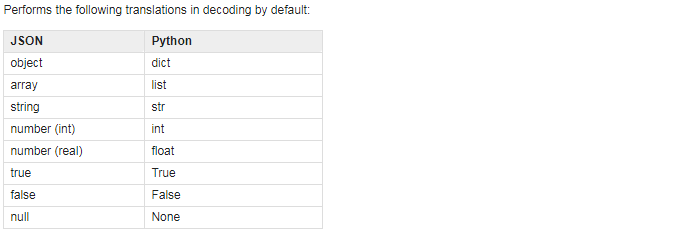JSON (JavaScript Object Notation) 是一种轻量级的数据交换格式。
JSON模块属于Python的标准库,在安装python时会被默认安装,使用时直接import即可,无需单独安装。
Python可以使用 json 模块来对 JSON 数据进行编解码。
先看看帮助文档:
>>> import json
>>> dir(json)
['JSONDecodeError', 'JSONDecoder', 'JSONEncoder', '__all__', '__author__', '__builtins__', '__cached__', '__doc__', '__file__', '__loader__', '__name__', '__package__', '__path__', '__spec__', '__version__', '_default_decoder', '_default_encoder', 'codecs', 'decoder', 'detect_encoding', 'dump', 'dumps', 'encoder', 'load', 'loads', 'scanner']
JSON模块包括两个常用的内置函数:
- json.dumps():对数据进行编码,序列化。将python对象编码为json字符串。
- json.loads():对数据进行解码,反序列化。将json字符串解码为python对象。
在json的编解码过程中,python的原始类型与json类型会相互转换。
Python 编码为 JSON 类型转换对应表:

JSON 解码为 Python 类型转换对应表:

用法如下,文档太长参数说明太多,这里只贴了语法格式部分:
>>> help(json.dumps)
Help on function dumps in module json:
dumps(obj, *, skipkeys=False, ensure_ascii=True, check_circular=True, allow_nan=True, cls=None, indent=None, separators=None, default=None, sort_keys=False, **kw)
Serialize ``obj`` to a JSON formatted ``str``.
>>> help(json.loads)
Help on function loads in module json:
loads(s, *, encoding=None, cls=None, object_hook=None, parse_float=None, parse_int=None, parse_constant=None, object_pairs_hook=None, **kw)
Deserialize ``s`` (a ``str``, ``bytes`` or ``bytearray`` instance containing a JSON document) to a Python object.
If the data being deserialized is not a valid JSON document, a JSONDecodeError will be raised.
注意上述文档说的是str,也就是这两个方法操作的是JSON格式的字符串。
示例:
>>> users=[{'name':'keith','age':18,'tel':110},{'name':'jerry','age':36,'tel':112}]
>>> import json
>>> j=json.dumps(users)
>>> j
'[{"name": "keith", "age": 18, "tel": 110}, {"name": "jerry", "age": 36, "tel": 112}]'
>>> users2=json.loads(users_json)
>>> users2
[{'name': 'keith', 'age': 18, 'tel': 110}, {'name': 'jerry', 'age': 36, 'tel': 112}]
默认的格式并不美观,常见的JSON文档都是带缩进的,这里当然也可以,json.dumps()提供了可选参数。
>>> print(json.dumps(users,sort_keys=True, indent=4, separators=(',', ': ')))
[
{
"age": 18,
"name": "keith",
"tel": 110
},
{
"age": 36,
"name": "jerry",
"tel": 112
}
]
If indent is a non-negative integer or string, then JSON array elements and object members will be pretty-printed with that indent level. An indent level of 0, negative, or "" will only insert newlines. None (the default) selects the most compact representation. Using a positive integer indent indents that many spaces per level. If indent is a string (such as " "), that string is used to indent each level.
缩进是一个非负整数或字符串,默认为None。
If specified, separators should be an (item_separator, key_separator) tuple. The default is (', ', ': ') if indent is None and (',', ': ') otherwise. To get the most compact JSON representation, you should specify (',', ':') to eliminate whitespace.
分隔符是一个元祖, 包含两个元素,一个是item分隔符,一个是kv分隔符。默认为 (', ', ': ')。
If sort_keys is true (default: False), then the output of dictionaries will be sorted by key.
sort_keys如果为true,则输出的字典会以key排序。默认为False。
如果你要处理的是文件而不是字符串,可以使用json.dump()和json.load()来编码和解码JSON数据。
>>> help(json.dump)
Help on function dump in module json:
dump(obj, fp, *, skipkeys=False, ensure_ascii=True, check_circular=True, allow_nan=True, cls=None, indent=None, separators=None, default=None, sort_keys=False, **kw)
Serialize ``obj`` as a JSON formatted stream to ``fp`` (a ``.write()``-supporting file-like object).
>>> help(json.load)
Help on function load in module json:
load(fp, *, cls=None, object_hook=None, parse_float=None, parse_int=None, parse_constant=None, object_pairs_hook=None, **kw)
Deserialize ``fp`` (a ``.read()``-supporting file-like object containing a JSON document) to a Python object.
示例:
写入JSON数据
with open('data.json', 'w') as f:
json.dump(data, f)
读取数据
with open('data.json', 'r') as f:
data = json.load(f)
>>> with open('data.json', 'w') as f:
... json.dump([{'name':'keith','age':18,'tel':110},{'name':'jerry','age':36,'tel':112}], f)
...
# cat data.json
[{"name": "keith", "age": 18, "tel": 110}, {"name": "jerry", "age": 36, "tel": 112}]
>>> with open('data.json', 'r') as f:
... data = json.load(f)
...
>>> data
[{'name': 'keith', 'age': 18, 'tel': 110}, {'name': 'jerry', 'age': 36, 'tel': 112}]
参考:
https://docs.python.org/3/library/json.html
http://www.runoob.com/python/python-json.html
http://www.runoob.com/python3/python3-json.html